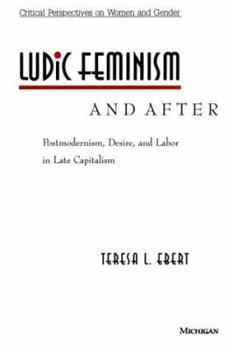Ludic Feminism and After: Postmodernism, Desire, and Labor in Late Capitalism
Select Format
Select Condition 
Book Overview
Following the equal-rights struggles of the 1960s, feminism became involved in the theoretical problems posed by poststructuralism, psychoanalysis, semiotics, queer theory, postcolonialism, and Marxism. After years of debate about whether feminism can or should accommodate these other modes of contemporary thought, Ludic Feminism and After provides a way of making a leap forward.
Teresa Ebert rethinks such notions as "pleasure," "essentialism,"...
Format:Paperback
Language:English
ISBN:0472065769
ISBN13:9780472065769
Release Date:December 1995
Publisher:University of Michigan Press
Length:352 Pages
Weight:1.10 lbs.
Dimensions:0.9" x 6.0" x 9.0"
Customer Reviews
1 rating
Feminism and class
Published by Thriftbooks.com User , 15 years ago
Over a decade ago, when Ebert's Ludic Feminism and After was published, in the words of one critic, it "knock[ed] the philosophical stuffing out of most" poststructuralist and postmodernist theories. It has continued to shape contemporary feminist critique and critical and cultural theory. Ebert's book is a devastating critique of ludic feminism ("a feminism that is founded upon assumptions about linguistic play, difference, and the priority of discourse and [which] thus substitutes a politics of representation for radical social transformation"). The book lays the groundwork for a new red feminism for the twenty-first century. At the core of her argument is the question of "materialism," namely that reality is objective and "independent from the consciousness of the subject and outside language and other media." Ludic feminism, on the other hand, understands materialism as primarily a question of language (what Ebert calls matterism) thus transforming "objectivity" into a purely epistemological issue which is, according to Ebert, a return to a form of negative theology--a way to "bring back transcendentalism in a more postmodern and thus convincing rhetoric" and consequently erase the question of class as the structuring force of gender and sexuality. Materialism for red feminism is above all a conflictually structured historical praxis of labor: "a structure of conflicts that determines other practices." This red materialism is what has caused the greatest hostility to Ebert's book and is routinely dismissed as determinist, reductionist, and indifferent to "difference." Ebert shows how poststructuralism--in spite of its valorizing of "difference" and its emphasis on the "specificity" of difference--is a form of discursive monism that renders all differences as finally "the same," as the outcome of the same ludic "law" of différance. Red materialism goes beyond the segregation of social differences in the superstructure to foreground their connection in the global material basis, namely labor, property, and class. At a time when most feminists continue to find such struggle-concepts as "class," "exploitation," and "labor theory of value" too "crude," and are abandoning the politics of "emancipation" as outdated in favor of choice, "desire," and recognition, Ebert's book poses for feminists this fundamental question: should feminism be practices in local matters of difference, gender and sexuality, and mired in eclectic genealogies, intersectionality and "subtle" heterogeneities; or should it be the revolutionary theory of international class struggles for freedom from necessity? These are questions that she addresses in a more expanded mode in her new books Class in Culture and even more directly in The Task of Cultural Critique.





